 W
WGalician is an Indo-European language of the Western Ibero-Romance branch. It is spoken by some 2.4 million people, mainly in Galicia, an autonomous community located in northwestern Spain, where it is co-official with Spanish. The language is also spoken in some border zones of the neighbouring Spanish regions of Asturias and Castile and León, as well as by Galician migrant communities in the rest of Spain, in Latin America including Puerto Rico, the United States, Switzerland and elsewhere in Europe.
 W
WThe Cancioneiro da Ajuda is a collection of Galician-Portuguese lyric poems probably dating from the last quarter of the 13th century. It is the oldest of the Galician-Portuguese cancioneiros with secular music.
 W
WThe Cantigas de Santa Maria are 420 poems with musical notation, written in the medieval Galician-Portuguese language during the reign of Alfonso X of Castile El Sabio (1221–1284) and often attributed to him.
 W
W.gal is a GeoTLD intended to highlight the Galician people, Galician language, and Galician culture. It was approved on 14 June 2013 by ICANN, and the first 93 domains went online on July 25, 2014.
 W
WGalicia irredenta or Galicia estremeira, also spelled as Galiza irredenta and Galiza estremeira and also known as Faixa Leste or Franxa Leste, is a term used for all Galician-speaking territories located outside of Galicia. These are all located in Spain, in either Asturias or Castile and León. These territories are sometimes divided into three subregions: El Bierzo, Eo-Navia and As Portelas.
 W
WThe Galician Academy of the Portuguese Language is a learned institution dedicated to the advancement, study, and normalization of Galicia's language. The academy promotes Reintegrationism, the concept that the language spoken in Galicia is in fact merely a dialect of the Portuguese language and should be standardized to the international Portuguese norms of language.
 W
WThe Galician Language Association is a reintegrationist association established in 1981 which seeks the full restoration ("re-integration") of Galician as a branch of Galician-Portuguese. It also aims for the official incorporation of Galicia into the Community of Portuguese Language Countries. It was originally formed by professional linguists only, although membership was soon made available to individuals showing an interest in the promotion of Galician culture, language, and the ideas of linguistic reintegrationism.
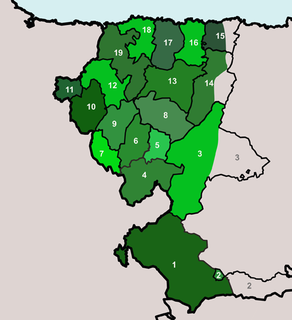 W
WGalician–Asturian or Eonavian is a set of Romance dialects or falas whose linguistic dominion extends into the zone of Asturias between the Eo River and Navia River. The dialects have been variously classified as the northeastern varieties of Galician, as a linguistic group of its own, or as a dialect of transition between Galician and Asturian.
 W
WGalician-Portuguese, also known as Old Portuguese or as Medieval Galician when referring to the history of each modern language, was a West Iberian Romance language spoken in the Middle Ages, in the northwest area of the Iberian Peninsula. Alternatively, it can be considered a historical period of the Galician and Portuguese languages.
 W
WGheada is a term in Galician to describe the debuccalisation of the voiced velar stop to a voiceless pharyngeal fricative.
 W
WLatín dos canteiros or verbo dos arginas is an argot employed by stonecutters in Galicia, Spain, particularly in the area of Pontevedra, based on the Galician language. They handed down their knowledge in the art of how to split and cut stone by means of this secret language to the next generation.
 W
WMendinho, also Meendinho, Mendiño and Meendiño, was a medieval Iberian poet.
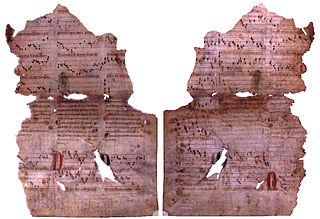 W
WThe Pergaminho Sharrer is the name given to a mediaeval parchment fragment containing seven songs by King Denis of Portugal, with lyrics in the Galician-Portuguese language and musical notation.
 W
WThe Proxecto Trasno is an open community dedicated to localise open-source software to Galician language. Since it was founded at the end of the 1999, its volunteers have been engaged in the Galician translation of the main FLOSS projects, from desktop environments to Linux distributions and in creating spell-checkers or developing localization tools.
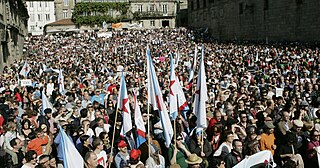 W
WQueremos Galego or Plataforma Queremos Galego! is a citizen platform and social movement, consisting of 600 entities from different areas and by people individually, that was born in 2009 to articulate a collective response in defense of the Galician language, its public use and the linguistic rights of the Galician-speaking population. The main actions of the platform are demonstrations and public acts. The current main goal of Queremos Galego is to fight against the linguistic policy of the People's Party of Galicia.
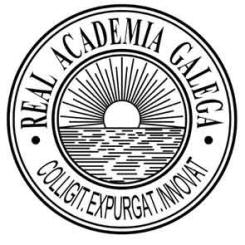 W
WThe Royal Galician Academy is an institution dedicated to the study of Galician culture and especially the Galician language; it promulgates norms of grammar, spelling, and vocabulary and works to promote the language. The Academy is based in A Coruña, Galicia, Spain. The current president is Víctor Fernández Freixanes.
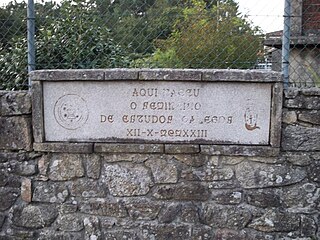 W
WThe Seminar of Galician Studies was an institution established in 1923 with the purpose of studying and promoting the Galician cultural heritage.